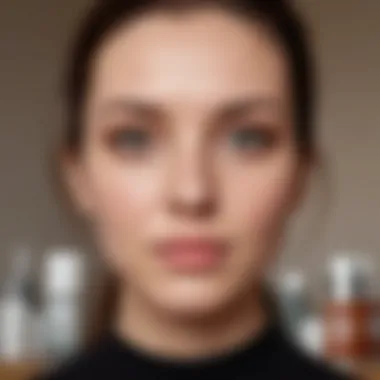Effective Strategies to Prevent Pimples


Intro
Pimples are a common concern for many individuals. They can be frustrating and sometimes lead to a lack of confidence. Understanding the factors that contribute to pimples is essential in managing skin health. This guide not only focuses on the causes of acne but also presents various strategies to prevent its occurrence. By exploring dietary choices, skincare practices, and lifestyle adjustments, we aim to provide useful insights that can help improve skin quality.
Effective skincare is not just about products; it's also about understanding your skin's unique needs and responding accordingly.
Insider Beauty Tips
Beauty Hacks
- Hydration is key: Drinking adequate water daily helps keep your skin hydrated. This reduces the risk of pores becoming clogged by dead skin cells.
- Non-comedogenic products: When selecting skincare or makeup products, opt for those labeled as non-comedogenic. These are less likely to clog pores.
- Spot treatments: Applying a small amount of tea tree oil or salicylic acid directly can help minimize pimples when they first appear.
Skincare Tips
- Cleanse gently: Use a mild cleanser to wash your face twice a day. Avoid harsh scrubbing as this can irritate the skin.
- Exfoliate: Regular exfoliation can help remove dead skin cells. A gentle exfoliant with lactic acid can be beneficial twice a week.
- Moisturize: Even oily skin needs hydration. Lightweight, oil-free moisturizers can maintain skin moisture balance without contributing to acne.
Haircare Secrets
- Keep hair clean: Oils and products from your hair can transfer to your face. Regular washing can help prevent breakouts, especially for those with long hair.
- Avoid heavy hair products: Some styling products can contribute to clogged pores if they come into contact with the skin. Use lighter alternatives.
Product Reviews
Skincare Products
- CeraVe Hydrating Cleanser: A gentle option that provides moisture without stripping the skin.
- Neutrogena Oil-Free Moisturizer: This product is lightweight and formulated for breakout-prone skin.
Makeup Products
- Fenty Beauty Pro Filt'r Soft Matte Foundation: Offers coverage without feeling heavy or clogging pores.
- Maybelline Fit Me Matte + Poreless Foundation: A budget-friendly choice that controls oil and provides a natural finish.
Haircare Products
- Briogeo Scalp Revival: A detoxifying scalp scrub that helps with overall scalp health and can prevent excess oil transfer.
- Moroccanoil Dry Shampoo: A light formula that helps absorb grease without weighing the hair down.
Makeup Trends
Latest Makeup Trends
Keeping makeup fresh yet uncomplicated can help prevent skin issues. A focus on minimalism with lightweight products is trending, allowing skin to breathe while still enhancing natural beauty.
Seasonal Makeup Looks
As seasons change, so do makeup trends. Warmer weather often calls for lighter formulas and brighter colors, whereas colder months might encourage richer textures and deeper hues.
Celebrity Beauty Inspiration
Many celebrities advocate for skin health alongside beauty. Following their skincare routines can offer insights into effective practices.
Beauty Industry News
New Product Launches
Manufacturers constantly innovate in skincare and makeup. Keeping an eye on product launches can help you discover the newest solutions for preventing acne.
Brand Collaborations
Collaborations between skincare brands and makeup artists often lead to exciting new products aimed at enhancing skin health and aesthetic appeal.
Beauty Events Coverage
Major beauty expos showcase the latest trends and innovations. Participation in these events can provide a wealth of information on effective practices and products.
Understanding Pimples
Understanding pimples is crucial for anyone looking to improve their skin health. This section lays a foundation for the entire article, as it provides insight into the biological processes and factors that contribute to acne development. By comprehending how pimples form and evolve, one can better implement preventive measures and strategies tailored to individual skin needs. Moreover, an informed approach allows for more effective selection of skincare products and lifestyle adjustments that align with one’s specific concerns.
The Biology of Acne


Acne is primarily a skin condition that arises from clogged hair follicles. These follicles can become obstructed by excess oil, dead skin cells, and bacteria. Sebaceous glands produce sebum, an oily substance essential for skin health, but when produced excessively, it can lead to blockage. The bacteria within the follicles, specifically Propionibacterium acnes, may multiply and cause inflammation, resulting in the painful and unsightly red bumps. Understanding this biology helps in addressing acne at its source, making it easier to prevent its occurrence.
Types of Pimples
Pimples can present in several forms, each requiring different approaches for treatment and prevention. The main types include:
- Whiteheads: Small, flesh-colored bumps that form when hair follicles are fully blocked.
- Blackheads: Open comedones characterized by dark spots at the follicle’s surface, often caused by oxidation of sebum.
- Papules: Small, inflamed bumps without pus.
- Pustules: Red, swollen bumps containing pus on the top, often painful.
Each type of pimple relates to a different level of follicular blockage and inflammation, necessitating targeted strategies for prevention.
Psychological Effects of Acne
The impact of acne extends beyond the physical, affecting an individual’s mental health as well. Studies show that those experiencing severe acne often report feelings of embarrassment, low self-esteem, and social anxiety. The relentless cycle of trying to manage acne can lead to frustration, impacting daily life.
A study stated: > "Acne can significantly affect interpersonal relationships and one's quality of life."
Recognizing these psychological effects is key in addressing the emotional burden of acne. By understanding the significance of preventative measures, individuals can take charge of their skin health, potentially improving their overall emotional well-being.
In summary, understanding pimples is not merely academic; it informs practical action. From biological insights to acknowledgment of acne's social impact, this knowledge is a stepping stone to clearer skin and enhanced self-confidence.
Diet and Acne Prevention
Diet significantly influences skin health and can play a vital role in preventing pimples. A balanced diet provides essential nutrients that not only support overall well-being but also enhance the skin's ability to defend against acne. Research indicates that certain dietary choices can aggravate or reduce the severity of acne. Thus, understanding which foods may contribute to breakouts alongside those that promote skin health is crucial for anyone looking to maintain clear skin.
Foods to Avoid
Certain foods are likely to trigger acne, mainly due to their effects on insulin levels and inflammation. Some of these foods include:
- Dairy Products: Milk and dairy products might increase acne outbreaks for some individuals. The hormones present in dairy could interact with the body's own hormones, potentially leading to increased oil production in the skin.
- Sugary Foods: High sugar diets can spike insulin levels, leading to increased sebum production and subsequently more pimples. Sweets, pastries, and refined carbohydrates should be consumed in moderation.
- Fast Food: High in unhealthy fats and sugars, fast food may contribute to acne flare-ups. The consumption of fried foods can also lead to heightened inflammation in the body, complicating skin issues.
Understanding these triggers allows for more informed dietary choices, ultimately supporting skin health.
Nutritional Deficiencies
Deficiencies in specific vitamins and minerals can adversely affect skin health. Identifying and addressing these deficiencies is important for maintaining clear skin. Common deficiencies that may lead to poor skin health include:
- Zinc: Critical for skin repair, zinc deficiency can result in increased susceptibility to acne. This mineral helps control androgen levels and reduce inflammation.
- Vitamin A: Essential for skin cell production and repair, low levels of vitamin A can lead to dry skin and clogged pores. Including foods such as carrots, sweet potatoes, and spinach can replenish this nutrient.
- Omega-3 Fatty Acids: Found in fish and flaxseeds, omega-3 fatty acids help to reduce inflammation, which can minimize acne outbreaks. A lack of these essential fats may worsen existing skin conditions.
Addressing these deficiencies through a nutrient-rich diet is fundamental for clearer skin.
Anti-Inflammatory Foods
Incorporating anti-inflammatory foods into your diet can provide the skin with the necessary tools to combat acne. Foods rich in antioxidants and anti-inflammatory properties may assist in reducing the frequency of breakouts. Some beneficial food choices are:
- Berries: Blueberries and strawberries are high in antioxidants, helping to combat oxidative stress on the skin.
- Leafy Greens: Vegetables like kale and spinach promote healthy skin through their anti-inflammatory effects and vitamin content.
- Fatty Fish: Salmon and mackerel contain omega-3 fatty acids, critical for maintaining skin hydration and reducing inflammation.
By focusing on these foods, one can harness the power of nutrition to help prevent pimples. A conscious dietary approach emphasizes balance and mindfulness in food choices while ultimately contributing to healthier skin.
Skincare Routine Essentials
A solid skincare routine is crucial in the fight against pimples. Understanding the specific steps and products to incorporate can greatly influence skin health and acne prevention. Regularly following a well-structured routine can help clear existing blemishes while preventing new ones from forming. This section will focus on essential aspects of skincare that support the prevention of acne.
Cleansing Practices
Cleansing is the foundation of any good skincare routine. It serves to remove dirt, oil, and other impurities from the skin. Regular cleansing can prevent clogged pores, a primary contributor to acne development. Choosing the right cleanser is essential.
- Look for a gentle, non-comedogenic cleanser that balances the skin without stripping away essential moisture.
- Cleansing twice a day is generally advised. Morning routines prepare the skin for the day's exposure, while evening routines remove makeup and pollutants accumulated throughout the day.
- Exfoliating regularly, about 2-3 times a week, can also help. Exfoliants remove dead skin cells, reducing the chances of pore blockage.
Daily cleansing is not just about hygiene; it's about maintaining skin balance and health.
Moisturizers and Acne
Many individuals fear that using moisturizers will worsen acne. However, moisturizing is vital for all skin types, including oily and acne-prone skin. A suitable moisturizer can help keep the skin hydrated and prevent it from producing excess oil. When selecting a moisturizer, consider the following points:
- Choose non-comedogenic products to avoid clogging pores.
- Look for lightweight, oil-free formulas that do not contribute to excess shine.
- Ingredients such as hyaluronic acid or glycerin can provide hydration without heaviness.
- Apply moisturizer immediately after cleansing to lock in moisture and create a barrier against environmental factors.
Sun Protection Strategies


Sun protection is often overlooked in acne prevention but plays an integral role in maintaining skin health. Damaging UV rays can lead to skin inflammation, which may aggravate acne. Protecting the skin from the sun is necessary regardless of the season or weather conditions.
- Use a broad-spectrum sunscreen with at least SPF 30 every day, even on cloudy days.
- Incorporate physical sunscreens containing zinc oxide or titanium dioxide, as these tend to be less irritating on acne-prone skin.
- Reapply sunscreen every two hours, especially when outdoors.
- Wearing protective clothing, such as hats or long sleeves, further assists in preventing sun exposure.
In summary, the essentials of a skincare routine—cleansing, moisturizing, and sun protection—greatly influence the health of the skin. By committing to these practices, individuals can create a solid foundation for preventing pimples and maintaining a clear complexion.
Product Selection Tips
Selecting the right products for skincare is crucial for maintaining healthy skin and preventing the formation of pimples. The products you choose can greatly influence how your skin reacts. It is not only about what you apply but also how ingredients perform on your skin type. Thus, understanding product selection is a fundamental part of an effective acne prevention strategy.
Comedogenic vs Non-Comedogenic Products
Comedogenic products are those that tend to clog pores, potentially leading to the formation of pimples. On the other hand, non-comedogenic products are formulated to minimize this risk. When selecting skincare or makeup products, it is essential to choose non-comedogenic options, especially if you are prone to breakouts.
Here are key factors to consider:
- Read Labels: Always check product descriptions and ingredient lists. Look for the term 'non-comedogenic.'
- Skin Type Awareness: Identify your skin type and choose products that cater to its specific needs to avoid adverse reactions.
- Ingredients Matter: Products with heavy oils or certain silicones can be comedogenic for some people.
Active Ingredients to Look For
When trying to prevent pimples, the ingredients in your skincare products are of utmost importance. Certain active ingredients are known to help reduce acne and improve skin health. Here are a few noteworthy ones:
- Salicylic Acid: It helps exfoliate the skin and unclog pores.
- Benzoyl Peroxide: This ingredient kills bacteria and reduces inflammation.
- Hyaluronic Acid: Although not directly related to acne prevention, it hydrates the skin, making it less likely to overproduce oil.
When choosing products, focus on those containing one or more of these active ingredients for better acne management.
Patch Testing New Products
Before fully integrating a new product into your skincare routine, conducting a patch test is highly recommended. This step is essential to avoid potential adverse reactions that could exacerbate acne.
To patch test effectively:
- Select a Small Area: Choose a discreet location like the inside of your wrist or behind your ear.
- Apply the Product: Use a small amount of the product on that area.
- Monitor for 24-48 Hours: Observe for any redness, swelling, or irritation.
Performing a patch test can help you avoid products that may cause acne or irritation. It is a simple yet effective method of ensuring compatibility with your skin.
By following these product selection tips, you can make informed decisions that support your skin health. Pay attention to the formulations, ingredients, and perform necessary tests to create a routine that works best for you. Careful evaluation not only fosters better skin but can lead to long-term prevention of pimples.
Lifestyle Factors Impacting Skin Health
Understanding the connection between lifestyle factors and skin health is essential for effective acne prevention. Skin does not exist in a vacuum; it is significantly influenced by various daily habits and choices. By addressing lifestyle factors, individuals can boost their skin's resilience and overall health.
One of the crucial aspects to consider is that lifestyle habits often work in tandem with other preventive measures. While skincare and diet are vital, lifestyle adjustments can enhance their effectiveness. Moreover, these changes foster not only better skin but also improved mental and physical well-being.
*
Stress Management Techniques
Stress plays a significant role in triggering acne outbreaks. High-stress levels can lead to hormonal fluctuations that increased oil production in the skin. To combat this, adopting effective stress management techniques becomes essential.
Mindfulness practices like meditation, yoga, or deep-breathing exercises can provide significant relief. These techniques help in reducing cortisol levels and promoting a calmer state of mind. Furthermore, engaging in hobbies that bring joy can shift focus away from stressors.
Look for classes or online resources that teach relaxation techniques. They can provide structure and help in forming consistent habits.
Sleep Quality and Skin Health
Sleep is often underestimated in its ability to impact skin health. The body undergoes reparative processes during sleep, including skin cell regeneration. Poor sleep quality can lead to inflammation and worsen acne.
Creating a restful sleep environment is vital. This includes a dark, quiet room and a comfortable mattress. Also, consider establishing a bedtime routine that allows the body to wind down. Limiting screen time before bed can also improve sleep quality.
Aim for seven to nine hours of sleep per night. Prioritizing sleep can lead to healthier, more vibrant skin over time.
Exercise and Its Benefits
Regular exercise has various benefits for skin health, primarily through its effects on circulation and stress reduction. Exercise increases blood flow, ensuring that nutrients and oxygen reach skin cells efficiently. This process can help in flushing out toxins, contributing to clearer skin.
Additionally, physical activity stimulates the production of endorphins, which can improve mood and counteract stress. Simple activities such as walking, jogging, swimming, or even home workouts can incorporate beneficial movement into daily routines.


It is also important to maintain a post-exercise skincare routine. Sweating can lead to clogged pores if not addressed promptly. Thus, cleansing the skin after working out is essential to maintaining its health.
In summary, integrating effective stress management techniques, ensuring restful sleep, and engaging in regular exercise can significantly influence skin health. These lifestyle factors are impactful tools in the pursuit of clearer skin and should not be overlooked.
Identifying Acne Triggers
Understanding what triggers acne is essential for effective prevention strategies. Acne can manifest due to various factors, and identifying these triggers allows individuals to take specific actions to mitigate them. This knowledge enables a proactive approach, empowering those affected to maintain better skin health. Being aware of potential triggers also helps in customizing skincare routines and overall lifestyle choices.
Hormonal Fluctuations
Hormones play a significant role in acne development. During puberty, menstrual cycles, pregnancy, and even stress can cause hormonal imbalances that lead to increased sebum production. This excess oil can clog pores, promoting the growth of bacteria and, subsequently, acne. Monitoring one's hormonal changes can be instrumental. For example, many women notice flare-ups around their menstrual cycle. Keeping a diary to track these changes can help identify patterns. Treatments such as hormonal contraceptives may help in reducing these fluctuations, making it a crucial area to explore for those prone to hormonal acne.
Environmental Factors
The environment significantly influences skin health. Pollution, humidity, and temperature changes can all trigger acne. Pollutants can settle on the skin, leading to clogged pores and inflammation. Hot and humid environments often increase sweat and oil production, compounding the problem. To combat these effects, regular cleansing is advisable. Incorporating a gentle cleanser that effectively removes impurities can help maintain clearer skin. Additionally, avoiding excessive sun exposure is crucial. Ultraviolet rays can dehydrate the skin, leading to an imbalance that might worsen acne.
Cosmetic Ingredients to Avoid
Many cosmetic products contain ingredients that may exacerbate acne. Comedogenic ingredients are notorious for blocking pores and leading to breakouts. Ingredients such as coconut oil, isopropyl myristate, and certain alcohols can contribute to irritation and acne development. It is important to read labels carefully and choose non-comedogenic products. Opting for mineral-based makeup can be beneficial for sensitive or acne-prone skin. Keeping a list of personal cosmetic culprits helps in making informed choices, thus reducing the risk of future breakouts.
Understanding your specific acne triggers is a vital step in preventive care. Knowledge empowers action.
By focusing on these elements, individuals can develop strategies tailored to their unique skin conditions and needs.
When to Seek Professional Help
Recognizing when to consult a healthcare professional is crucial for managing acne effectively. While many individuals can handle mild cases through home treatments, some situations require specialized attention. Understanding the signs indicating a need for professional intervention can significantly impact the outcomes of acne treatment. Early recognition may prevent further skin damage and psychological distress associated with severe breakouts.
Recognizing Severe Cases
Severe acne can manifest in various forms. It's essential to identify these indicators to seek timely help. Some signs include:
- Persistent breakouts that do not respond to over-the-counter treatments.
- Cystic acne, characterized by large, painful lumps beneath the skin.
- Inflammation and redness that encompass a considerable area of the skin.
- Scarring or hyperpigmentation resulting from previous acne lesions.
- Emotional distress, including anxiety or depression linked to appearance issues.
If two or more of these characteristics are present, it’s wise to consult a dermatologist.
Types of Treatments Available
A dermatologist can offer several treatment options tailored to the severity of acne. Common approaches include:
- Topical treatments, such as retinoids or benzoyl peroxide, to reduce inflammation.
- Oral medications, including antibiotics or hormonal therapies, to manage severe cases.
- Professional procedures, like chemical peels, light therapy, and extractions, which can aid in clearing stubborn acne.
- Customized skincare regimens that align with specific skin types and conditions.
The treatment plan will depend on individual circumstances. Therefore, a thorough assessment is crucial to determine the best course of action.
Importance of Medical Advice
Consulting with a healthcare professional before starting any treatment is vital. Medical advice offers several benefits:
- Professional evaluation helps distinguish between different acne types and root causes.
- Avoidance of ineffective treatments minimizes wasted time and resources.
- Management of side effects from stronger medications, which can mitigate risks to skin health.
Ultimately, seeking medical advice not only aids in effective treatment but also provides reassurance and support. Acne should not be treated lightly, especially severe cases that could lead to lasting effects.
"Ignoring acne can lead to long-term consequences, both physically and emotionally."
Being proactive about skin health can foster a favorable environment for healing. Through professional support, you can achieve better outcomes and enhance your overall skin condition.
The End
In the pursuit of clearer skin, understanding the various preventive measures against pimples is crucial. Summarizing key elements discussed in this article helps reinforce the importance of a multifaceted approach to skincare. Providing readers with actionable steps can foster more informed choices that are essential for effective acne prevention. From dietary adjustments to skincare routines, each measure plays a vital role in limiting breakouts and enhancing skin health.
Summary of Preventive Measures
A comprehensive review of preventive methods includes:
- Dietary Choices: Avoiding high-glycemic foods and foods rich in dairy can make a significant difference. Incorporating anti-inflammatory foods helps as well.
- Consistent Skincare Routine: Establishing a daily regimen that includes proper cleansing, moisturizing, and sun protection is essential for maintaining skin balance.
- Lifestyle Adjustments: Managing stress through relaxation techniques, ensuring quality sleep, and staying physically active contribute to overall skin health.
- Identifying Triggers: Understanding personal triggers, whether hormonal or environmental, allows for better control over acne breakouts.
- Seeking Professional Help: In severe cases, consulting with a dermatologist can provide specialized treatment options tailored to individual skin types and concerns.
Utilizing these measures forms a foundation for healthier skin. It is imperative to acknowledge that while improvements may take time, persistence and consistency yield positive results in the long run.
Encouragement for Continued Learning
Skincare is an evolving field, and remaining educated is essential for individuals who are invested in their skin health. There are always new research findings, products, and techniques emerging. By fostering a mindset of continual learning, readers empower themselves to adapt their skincare practices to current knowledge and trends.
Engaging with communities on forums such as reddit.com or following credible resources like britannica.com can help in gaining insights. Additionally, sharing experiences within such platforms can lead to discovering new strategies that may be useful.







